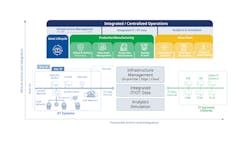A global pandemic, fractured supply chains, rising fuel costs and geopolitical conflict have all ratcheted up uncertainty among industrial enterprises around the world these past months and years. One result has been an increased sense of urgency to implement digital transformation strategies at scale, including those advancing the realization of Industrial Autonomy. Keith Larson, publisher of Control, recently caught up with Dr. Tsuyoshi Abe, senior vice president and head of marketing headquarters, Yokogawa Electric Corp., to get his take on the industry’s accelerating journey to Industrial Autonomy.
Q: The business environment of late has been more challenging than ever. In addition to the Corona virus (COVID-19) pandemic, geopolitical risks are increasing. How are manufacturing companies being impacted?
In this environment, management needs to aim for sustainable growth with a long-term perspective, while strengthening their companies’ resilience. Digital transformation using cutting-edge digital technologies also plays a vital role in this effort, and we see more and more companies turning to autonomous operations to advance their digital transformation goals. The transition to the next stage in the journey from Industrial Automation to Industrial Autonomy (IA2IA) is accelerated.
According to the results of our "Global Survey on Industrial Autonomy," released on Jan. 27, 2022, a full 51% of respondents indicated that they are expanding their implementation of Industrial Autonomy to multiple facilities and business units, and 19% indicated that they have already implemented it in one or more facilities or business units. The introduction and implementation of Industrial Autonomy are steadily progressing, and Yokogawa proactively supports companies on their journey towards autonomous operations. In March, Yokogawa announced the conclusion of a customer field test in which AI was used to autonomously control a chemical plant for 35 consecutive days. It was the world’s first.
Q: How do you foresee the shift toward Industrial Autonomy proceeding from now on?
A: In various industries, companies’ transition to minimally manned and unattended autonomous operations will accelerate further, and use new technologies such as robots, drones, digital twins and AI. New methods of operations are being tested by applying these technologies in specific areas while looking toward autonomous operations. As a result, the range of Industrial Autonomy will expand with a mixture of different levels and states of autonomy.
Q: The scope of Industrial Autonomy is widely expected to scale beyond production sites and individual pieces of equipment to the enterprise level and fleets of assets. What challenges do companies face when expanding to the corporate level?
A: First, there’s the question of enabling technologies. In the real world, operational technology (OT) and information technology (IT) are separate, and organizations, processes, systems and data are unconnected. With IT/OT convergence, OT data can be analyzed in various ways by IT to derive solutions that can be fed back to the OT to improve efficiency and optimize operations. This is not achieved without understanding how to handle, analyze and make use of the enormous amounts of raw data collected by a typical industrial enterprise.
Q: How do companies face and address such challenges? What are the key points to transform efficiently and increase the scope of Industrial Autonomy from sites to the enterprise?
A: The transition from IA2IA won’t happen overnight. The most important thing is to connect and integrate operations so that companies can accelerate the transition. Mainly there are five objectives: 1) to centralize and efficiently manage operations, 2) to create highly effective multi-disciplinary teams, 3) to provide situational awareness of process, equipment, people, work and environment in real-time, 4) to collect and analyze information with a variety of advanced analytics like AI, for smart decision-making, and 5) to discover, design and develop a sustainable blueprint for operations and manufacturing.
Q: Operating efficiency certainly would be improved if management could increase situational awareness and quickly assess conditions at all levels of the organization. Is there anything that management should be aware of or concerned about?
A: Integrated Operations represents a company’s repositioning as a digital enterprise and a commitment to stay at the forefront of new technology to optimize operational and business process efficiency. It provides an optimal environment, helping process manufacturers maintain a technological and collaborative edge as they lead the way into the future.
Corporate activities cover a wide range of areas, including the production site, the entire company, the extended supply chain and society. Supply chains are becoming more complex and globalized, especially in recent years. They have been changing so rapidly that it is no longer possible to make correct business decisions based on management experience and intuition alone.
In the world today, everything is increasingly interconnected in complex ways, called a system of systems (SoS). The components function as independently operated and managed systems that work together to achieve a purpose that cannot be achieved by any single system. This trend will continue to advance.
Yokogawa will leverage our experience and expertise to help our customers achieve IT/OT convergence and support them so that they can achieve the shift toward digital enterprises and Industrial Autonomy.
Moreover, focusing on the trend toward SoS, Yokogawa will create value by effectively promoting connectivity and overall optimization driven by integration, autonomy and digitalization. Taking advantage of its expertise in OT and its project implementation capabilities, Yokogawa aspires to become an integrator that will lead the way forward in the realization of the SoS world.


